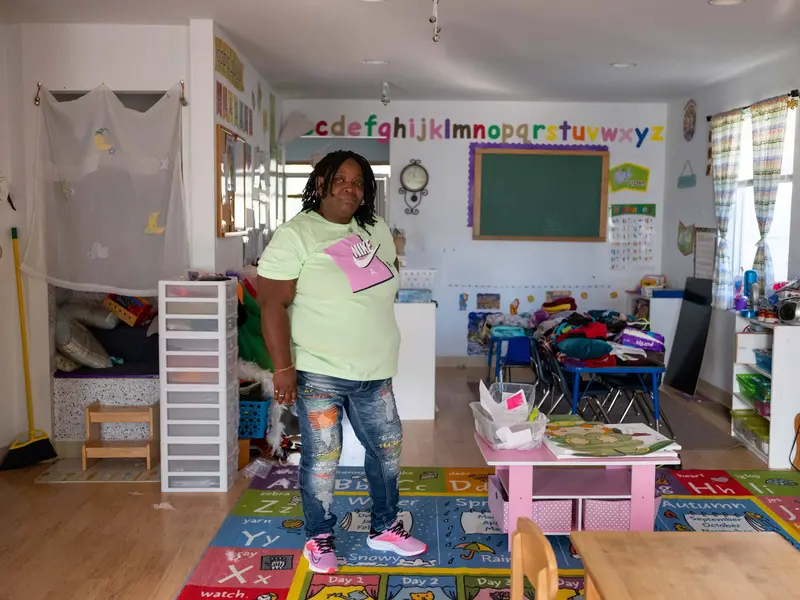Jackie Thomas pulled up to her child care center, Damion’s Place, picked up the mail and stretched out beside a baby on a giraffe-printed playmat. She opened a letter from state regulators who had sent over a motion in their case to shut her down. In the chaos of the past year, they’d found Jackie’s center in Overland Park, Kansas, out of compliance in small ways, like having a trash can without a lid, and larger ones, like being understaffed. A hearing was scheduled for Feb. 17, three weeks away.
As Jackie held the letter, a teacher delivered more bad news: She was planning to leave for nursing school, adding herself to the long list of staff Jackie had lost. Jackie ran a separate day care in her home, just across the border in Lee’s Summit, Missouri, but she relied on employees to operate Damion’s Place. If she didn’t hire new teachers fast, she’d be down to only one who was approved by the state: her 71-year-old mom, Bonnie, who’d stepped in to help.
“Good Lord, can y’all just throw one punch at a time?” Jackie said.
“For real,” Bonnie laughed from the other room. “They’re hitting you in the face.”
“Forget it,” Jackie sighed. She wore a blue T-shirt with the words “Don’t Try Me,” matching her spiky blue bob.
She’d barely settled into her wooden rocking chair when her phone rang. It was a mother, saying she’d tested positive for COVID-19 and was withdrawing her kid from the center. Jackie was used to hearing from parents who’d gotten sick or lost jobs. At the start of the pandemic, Jackie had 112 kids; now, she was down to 26. Before she could process the call, her phone rang again. It was another mom who’d been diagnosed with the virus; three more kids gone. In an instant, Jackie calculated, she was out $3,200 that month.
Jackie had run her home child care for nearly a decade when she’d opened Damion’s Place in February 2020. The center, which was awaiting its license, was her chance to present a quality option to working-class parents, who could usually only afford to leave their kids with relatives or in caregivers’ homes. She was proud to provide its amenities, with activities and curricula and meals, at prices families could pay. One day, if she could get enough kids, she hoped that her center would offer what most others didn’t: round-the-clock care that matched the rhythm of the modern workforce.
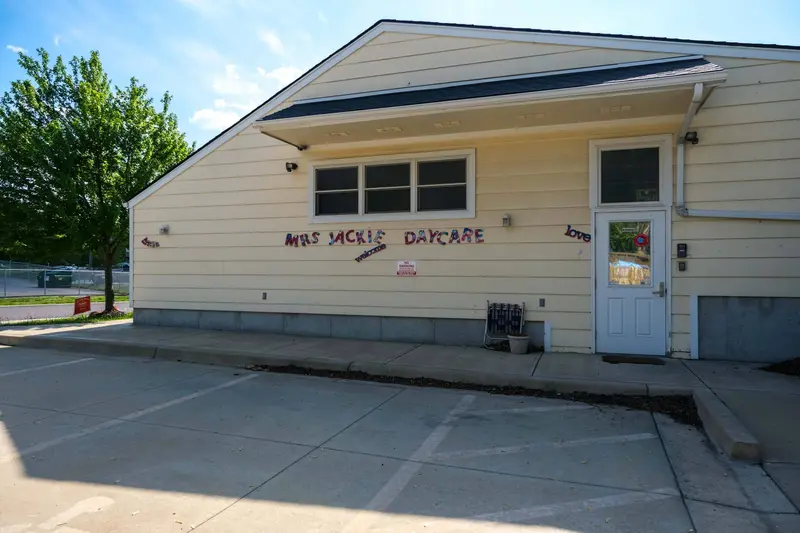
At 53 years old, Jackie was so confident in her vision, in her ability to meet the high demand, that she imagined herself on the verge of a big break. It seemed the need was everywhere: Most Americans live in child care deserts, where licensed facilities, if they exist at all, have little or no capacity for new kids. Jackie pictured her centers stretching across Kansas City, then the region, and eventually the country, with 24-hour services for the parents who needed them most. It was the legacy she planned to pass on to her own children, leaving a profit for them to live on. “This mind was created to generate income,” she said. “They can’t stop this seven-figure mind.”
It would have been a difficult business proposition even during normal times, in an industry plagued by thin profit margins and high staff turnover. Many families couldn’t afford to pay much, and government subsidies didn’t begin to cover the costs. The pandemic pushed providers to the edge: about 13% of day cares across the country have shuttered in the past year. President Joe Biden was promising a one-time injection of $39 billion in relief funds for the industry, and he was preparing to pitch the most ambitious reform in decades, aimed at creating affordable, quality child care that capped costs for parents and raised wages for providers. But since the details were still emerging, Jackie wasn’t sure how much of the hopeful talk coming out of Washington would translate into real support for businesses like hers.
Around 5 p.m., once the center had emptied of children, Jackie locked the doors, settled into her Nissan Versa and began to drive home. She was exhausted; she’d been caring for an infant overnight. She turned up some urban gospel, but it couldn’t quiet her rushing mind. She’d depleted her savings. She’d racked up $29,134 in credit card debt. The center was hemorrhaging money every day. Even if she could avoid bankruptcy, there was still the matter of the hearing. If the judge ruled against her, she’d fail the parents, many of them single mothers, who told her they would lose their jobs without the flexible care she offered.

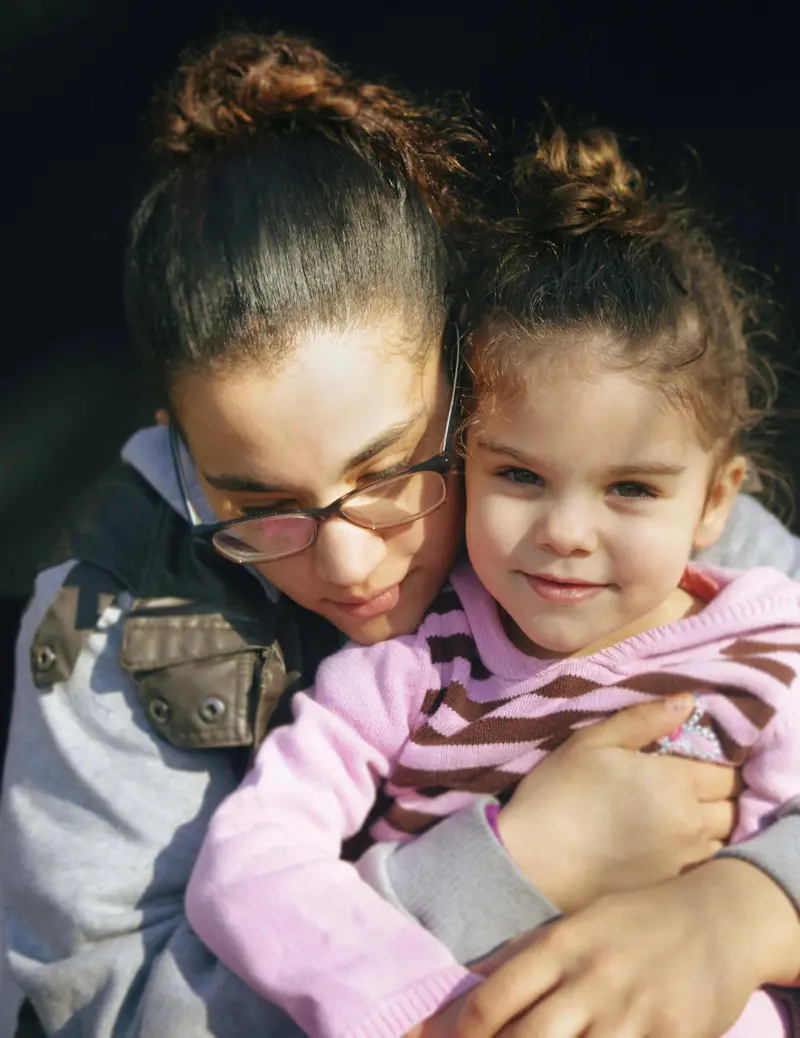
Under a darkening sky, she merged onto Interstate 435. She usually managed to find confidence in the future even during the most trying of times, and that optimism had propelled her for as long as she could remember. The primary ingredients of success, in Jackie’s view, were sweat and an entrepreneurial spirit. Plus, according to numerology, her “angel number” was 819, a sign of prosperity. Ten minutes into her drive, by the fast-food lights on Metcalf Avenue, Jackie fell asleep in the driver’s seat.
She found herself jolted awake, cars whooshing by. She clutched her wheel and swerved toward an exit. When her heartbeat finally slowed and she’d rolled down the windows, she was grateful she didn’t have children in the car but certain that something had to change. “Jesus, come on, come on,” she said, rocking in her seat. “I need your help.” She was becoming more aware by the day that she couldn’t keep this going much longer. Just give up, she told herself. It’s not going to hurt you. But Jackie couldn’t bear to let go.
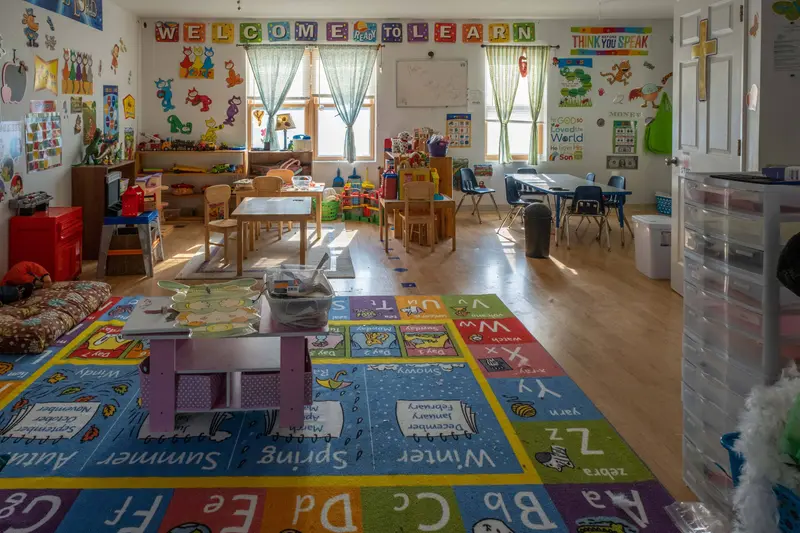
It was one of Jackie’s twin grandsons, Damion Thomas, who inspired her child care business. She’d raised eight children and two grandkids when Damion and his twin brother, Trayvion, were born, filling her home with a thrilling ruckus. Trayvion revealed himself to be a cuddler, always wanting to be held, and Damion was a quiet, crawling explorer. Each night, when Jackie came home from work, she swung open the door and called out for her “dump trucks.”
In September of 2008, after Jackie’s son and the twins’ mom split up, Jackie was awakened by a phone call: Damion, who was 2, was in critical condition. By the time Jackie arrived at the hospital, he had died. His forehead was bruised, his eyes were blackened and his neck was scored with scratches. His mom had gone to work that Saturday and left the kids with her new boyfriend, DeWhite Cameron. He was sentenced to life in prison for beating Damion to death.
Jackie didn’t like to talk about her grief or wear it on her face. She’d learned to cope with distress by throwing herself into work. When a fire had destroyed her house, when she’d left an unsafe relationship, Jackie had burrowed into her jobs, ascending from a Price Chopper cashier to a regional manager at Church’s Chicken. After the death of her grandson, she resolved to venture into an industry she knew nothing about, opening a home day care that would welcome kids whose parents worked all hours. In 2010, she started by watching her own grandchildren in her house, and by 2014, “Mrs. Jackie’s” was open to the public. The “Mrs.” was aspirational. She wasn’t married, but she believed in the aphorism “Fake it ’til you make it.”
Once again, her house filled with the cries and squeals of new life. She loved watching the infants take their first steps, say their first sentences, expand their vocabularies; she grew most attached to the kids who started with her young. She had a knack for teaching them to spell their names, to say “please” and “thank you.” She was particularly proud that she’d taught one boy, at 9 months old, to kiss a girl’s hand as a way to say, “I’m sorry.”
But it wasn’t long before Jackie grew frustrated with what she saw as a two-tiered system. Working-class parents, she realized, were sending their kids to home day care, with varying degrees of oversight. More well-off people had the option to send their children to licensed centers, with highly trained staff and regimented schedules. On balance, kids in informal home settings are less likely to get reading and counting instruction and more likely to watch hours of TV. Though the federal government doesn’t monitor safety in child care, the most comprehensive national study of the subject, from 2005, found that the death rate, though low, was more than 14 times higher in providers’ homes than in centers.
Child care in America has long been divided along class lines. The first “day nurseries” were developed by philanthropic women in the late 19th century to provide minimal protection for poor children, whose mothers had no choice but to work while wealthier moms stayed home. The service was designed merely to keep them alive, not to educate them. The first “nursery schools,” on the other hand, were created in the early 20th century for middle-class families who could afford to spend money on the social and developmental growth of their kids.
Federal policy entrenched the divide. The only universal child care legislation ever to pass Congress was vetoed in 1971 by President Richard Nixon, who denounced its “family-weakening implications.” Many conservatives had also opposed the program on the grounds that it would further racial integration. Republican congressman John Ashbrook said that one of the worst elements of the bill was that “the socioeconomic and race mix of students would reach its greatest potential under this legislation.” Instead, Nixon signed into law a child care credit, allowing parents who paid enough in taxes to claim a modest deduction. The policy primarily benefited middle- and upper-class families.
By 1990, low-income parents could receive slim child care subsidies, but President Bill Clinton dramatically changed the program in 1996. In response to fears of welfare dependency, Clinton signed legislation that made employment a condition of receiving the assistance. But the subsidies were too low. Soon after, struggling parents began taking on more second-shift, third-shift and weekend jobs just to get by.
Jackie found that many of her parents were spending a third of their income on care. Some weren’t getting subsidies; though federal guidelines allowed anyone earning up to 85% of their state’s median income to receive the aid, it gave states latitude to restrict access. The Missouri program usually accepted new parents who made under 45% of the median income, or $29,976 for a family of three. States calculate their subsidies based on market rates, but providers like Jackie tend to set prices based on what nearby parents can afford. For some of Jackie’s kids, the government pays as little as $7.70 a day.
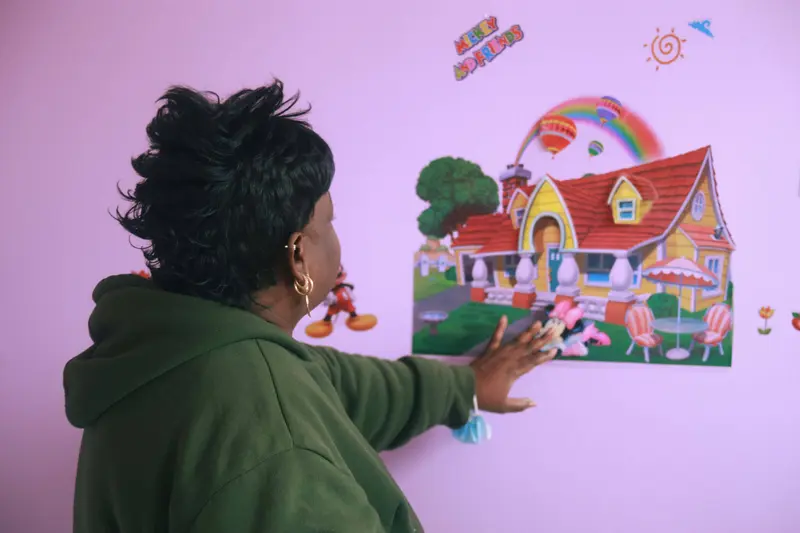
Jackie knew the finances would be hard, but she found herself dreaming of opening a licensed center for kids like hers as a bid to equalize care. Typical centers are open weekdays, 7 a.m. to 6 p.m., but Jackie figured that if she ran hers at all hours, she could bring in enough kids to set bargain prices for her parents. They were delivery drivers and nurses, waiters and cashiers, and their employers often required them to take on early-morning or late-night shifts. She’d charge $200 a week for toddlers and $265 for infants, but she was willing to accept a sliding-scale fee based on income.
By 2019, more than a decade after Damion died, Jackie had saved $60,000. She found a little schoolhouse in Kansas that used to be a Montessori academy, and she poured half of her savings into fixing it up: mulch for the playground, gates for the infants, costumes for dramatic play. She installed cameras to film every inch of the center so parents could tune in to check on their children. She advertised as “Mrs. Jackie’s Christian Daycare,” but she called it Damion’s Place. The center opened a month before COVID-19 was detected in Kansas.
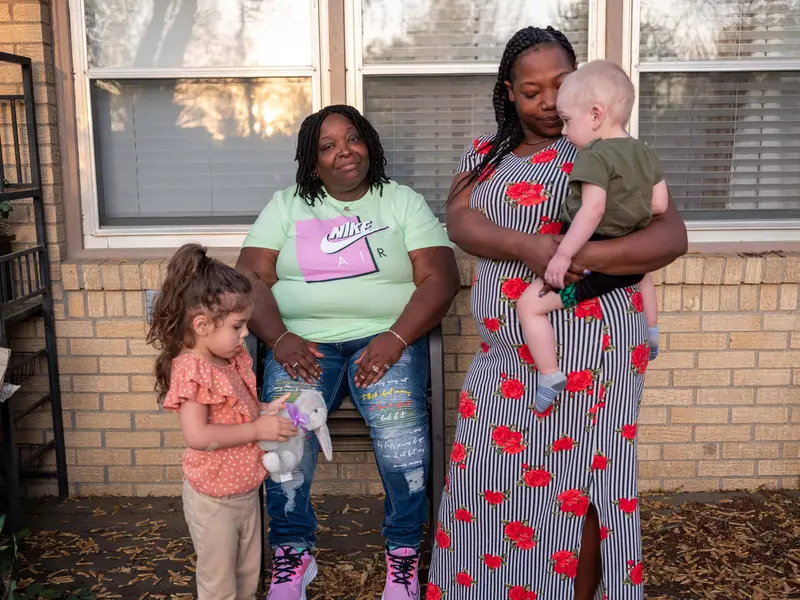
After Jackie fell asleep at the wheel this winter, she tried not to think about the upcoming hearing, which would determine if she could keep the center open. The only person she’d told was her mother, Bonnie, who occasionally relayed guidance she’d found on the internet. “Sometimes God will slow you down so that the evil ahead of you will pass before you get there,” Bonnie read aloud one afternoon at Damion’s Place. “Your delay could mean your protection.” Lying on her stomach, Jackie nodded as two young boys took turns sliding across her back.
Jackie had never been in trouble like this with regulators, and she believed the pandemic had caused this mess. Last spring, as the virus spread across the Midwest, more and more mothers lost work in the shutdowns. The government pumped money into the subsidy program, but still, Jackie couldn’t enroll enough kids at Damion’s Place to make ends meet; she compensated by packing her home child care all day and all night. Because of the unpredictable schedules of her parents, who were now deemed “essential workers,” Jackie needed to rotate kids between locations depending on where she had the capacity. She hired staff to shuttle them back and forth in her green Dodge Caravan and she slept two or three hours each night, when her daughter, Yolanda, who lived in her basement, relieved her.
Jackie was so stretched, in part, because she couldn’t find the right people to run Damion’s Place. She posted positions online, offered shifts to out-of-work moms and extended job offers to cashiers at her local Save-A-Lot. But those who had chronic conditions like diabetes and hypertension didn’t want to risk exposure; others had to stay home with their own kids who were attending school remotely. Jackie paid up to $12 an hour, but Walmart and Target offered similar wages, and they included benefits. Child care staffers — almost all women, and disproportionately women of color — were some of the lowest-paid workers in the country; more than a quarter quit their jobs each year.
With the feeding, diapering and teaching duties falling more squarely on Jackie, she couldn’t keep up with the many rules that centers must follow. Child-safety advocates, prompted by day care deaths, have spearheaded regulations at the federal and state levels over the past decade. But advocates for providers say that the only way operators can reasonably meet the evolving rules is if the government supplies them with the money and technical support to do so. Instead, states almost always ask child care operators to cover the costs — of buying softer furniture, or bringing on consultants, or taking new training. When providers fall out of compliance, the primary response is to punish them.
By June, Jackie’s business was starting to fall apart. On a humid Tuesday morning, a Missouri inspector named Romena Fox showed up at Jackie’s home day care, unannounced. Romena rapped on the front door, but no one answered. All she could hear were the high-pitched screams of children. After 15 minutes, she called the police, who pounded on the door for another 10 minutes. When they peered through a window, they noticed a young girl climbing in and out of a playpen and two others jumping on the floor. They couldn’t see an adult.
Once they called her phone, Jackie answered and let them in. She said she’d been doing paperwork while sitting in her bedroom entryway so that she could see kids napping in each of the three rooms. She had separated the children by sibling groups for social distancing, but she’d broken the rules by using a bedroom that hadn’t passed inspection. She apologized. Romena and another inspector noted that Jackie had too many infants in her home and that a playpen was broken. A young boy told them that Jackie had been sleeping.
Jackie knew she could do better, and she hated that her competence had been called into question. Embarrassed, she wrote Romena an email. “I thought I told you that sometimes when I am in the back I cannot hear the door,” she said. She explained that she had too many infants because a mom had shown up and asked Jackie to watch her kids while she ran errands. She hated turning down those requests; she’d already learned that one mom, who could no longer afford Jackie’s care, was leaving her young kids home unattended. As required by law, Jackie had reported her to authorities.
When Romena started calling parents, none complained about the quality of Jackie’s care. Mallory Talbott, who manages a barbecue restaurant, said parents knew to call the house phone if no one answered a knock. Emily Smiley, who works for Walmart, said, “You got to multitask with kids. When is she supposed to have time? She’s 24 hours a day.”
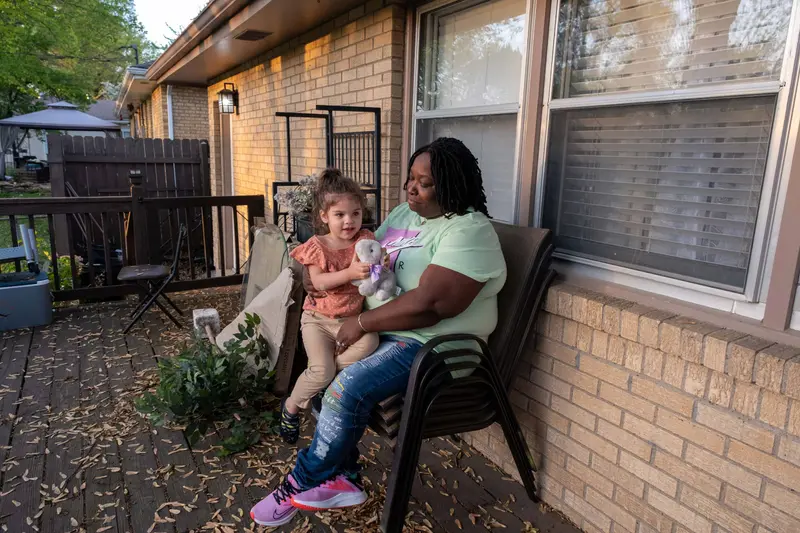
Neither mother’s schedule or slim budget left them with other options for nearby child care. Emily had found Jackie after the state of Missouri decided that her boyfriend wasn’t a safe guardian for her three kids. Jackie’s hours were what had allowed Emily to take a management promotion at Walmart’s bakery, a job that required night and weekend shifts. She was convinced that, without Jackie, she’d lose her job, which meant that next would come her car.
Brittney Fleming was equally reliant on Jackie; when she worked the night shift loading packages for FedEx, her two boys slept at Jackie’s home. She also took community college courses during the day, and sometimes her boys went to Damion’s Place. She wanted a degree, and ultimately a job with reasonable hours. With so few 24-hour child cares around, she saw Jackie’s support as key to getting there.
As a result of the bad inspection, Missouri proposed placing Jackie’s home day care license on probation. “A slap on the wrist,” Jackie called it.
Across the border that summer, Kansas inspectors kept showing up at Damion’s Place as well. They found a rusty nail in the wooden fence, which was also three inches shorter than the state-mandated minimum height. They discovered a new program director whose paperwork had yet to be filed with the state; Jackie had requested the form a couple of days earlier, but she hadn’t gotten around to mailing it. She wasn’t staying up to date on the documentation, and on two occasions, for brief periods of time, she wasn’t staffed at the right ratio. She needed one teacher for every three infants or every five toddlers. Jackie had been operating on a temporary permit, and in August, regulators submitted their formal intent to deny her license.
If the administrative law judge charged with Jackie’s case ruled against her, she would lose her kids at Damion’s Place and the revenues that came with them. She’d still have to pay rent. And she’d have to turn away parents like Brittney who depended on her.
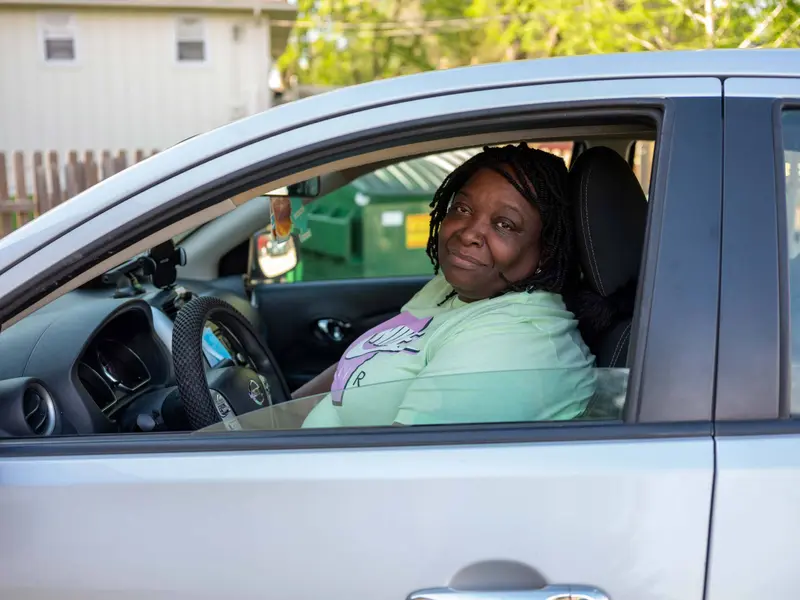
Four days before her Kansas hearing, Jackie pulled up to a rundown child care facility in Independence, Missouri, which hadn’t been used in years. She’d worked out a deal with its owner: If she handled the repairs, he’d start charging rent after she opened for business. She’d found it last summer, as a backup center in case Damion’s Place was shut down. Now, she was hoping that her contractors could get it done before the end of the week.
Jackie climbed the stairs to the boxy building, gripping the candy-striped railing. She grimaced at the pastel-colored bricks on the exterior. She wanted to paint the walls her favorite color, green, which meant “money” and “go.” She pushed open the heavy door and stepped into the foyer, where trash was heaped around her. “A lot of stuff,” she said. “We got a lot of work to do.”
Jackie had estimated the construction would cost about $6,000, but by now, it had snowballed into more than $30,000, the rest of her savings. She’d paid contractors to pour cement for the parking lot, lower the sinks to child height, lay a deck and patch the leaking roof. It was hard to keep track of everything left to do, and there wasn’t a simple list to follow. In the city of Independence, she needed approval from the building inspector, the health department, the fire department, the power and light department, the water department, the zoning department. It was one reason that child care experts didn’t expect new centers would pop back up once the economy recovered: They’re expensive to build and the bureaucracy overseeing them is a maze.
It was 7 degrees outside, and Jackie’s breath hung in the air as she fiddled with the thermostat, which didn’t seem to be working.
“Good morning,” said a man named Darrion Clark, whom Jackie had hired to fix up the place.
“You know something about furnaces?” Jackie asked, burying her hands in her pockets.
She walked around the center with purpose, in tall leather boots over red sweats. She glanced at the cracked paint on the hallway ceiling, mindful of inspections to come. “What do we do about this here?”
“You can just spray that shit with the texture,” said Darrion, miming it as he spoke. “Then you ain’t gotta worry about making sure it’s straight.”
Jackie rubbed the back of her head. She wondered whether the doors were wide enough.
“Thirty-five and three-quarters,” Darrion said, as he measured the entryway to the toddler room.
“I need 36 true and true,” Jackie replied. “When they come in here, you know they’ll be nitpicking.”
The afternoon sun cast long shadows down the main room.“The kids are gonna have a flippin’ good time,” Jackie said. “It’s gonna be real nice. Once I get it done.”
The problem, it appeared, was that the building was nowhere near done. She still needed a grease trap, emergency lights, a mop sink, a bottle sink and a prep sink for food, even though the city of Independence had told her that she wasn’t allowed to make food for her kids without a commercial kitchen. Jackie now wanted to get Yolanda to run a new business she’d start, Mrs. Jackie’s Catering Company, with a commercial kitchen and freezer trucks.
Yolanda, who was helping her mom ferry appliances, walked in, shivering. “It’s crazy out there,” she said, laughing about the cold.
Yolanda was worried about the project. She’d tried to warn her mother about taking on too much. One thing at a time, Yolanda repeated. At 35, she didn’t think she could move out of her mother’s basement; her mother didn’t know her limits, and Yolanda felt compelled to take on some of her mom’s load, “so her limit is part of my limit, too.” Even her 20-year-old son, Willie, had moved in to help them watch kids, and he was sleeping on an air mattress in the basement. Yolanda barely had any time. She worked 35 hours a week at Amazon, took high school courses online, and was learning to start a podcast, Spit Shit, so that one day, she, too, could be her own boss. Whatever hours were left she gave to her mom.
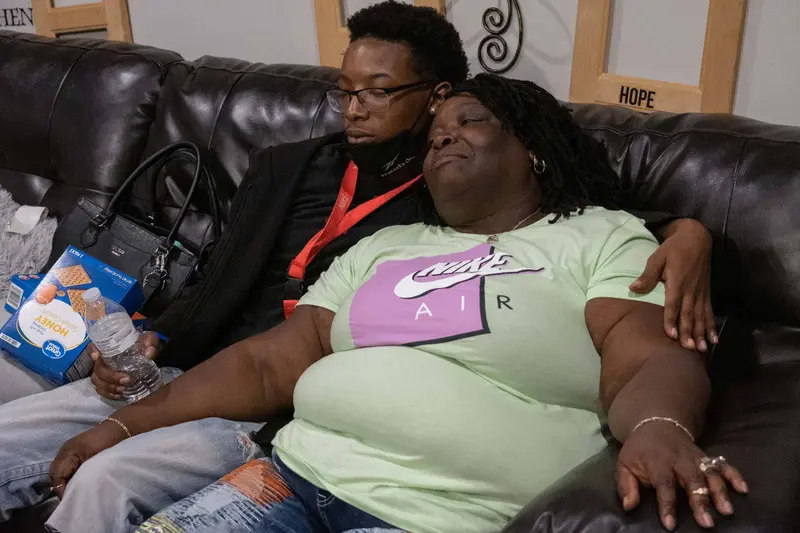
After Yolanda drove home, Jackie stood in silence in the shell of the defunct center she was hoping to resurrect. It began to dawn on her that she wouldn’t be able to open by her hearing date. Her backup plan wouldn’t be a backup at all.
“I think I’ll be all right,” she said.
Two days before her hearing, in her shaded home office, Jackie sat at her desk, which was strewn with fuzzy pens, an oversized calculator and several cell phones. They kept buzzing with notifications. A few moms texted saying they wanted to enroll their kids, and the fresh interest buoyed her spirits. She didn’t let on that Damion’s Place was on the line. She wanted to believe that she could make it work, that even if the center were shuttered, she’d find a way. Annette Ligon, whose daughter, S’Aniyah, was on Jackie’s weekend shift, called to explain that she now needed weekday care.
“Bring her back to me,” Jackie interrupted. “Boom, kick, bah.”
“I’ll bring her to you tomorrow,” Annette said. “I don’t know what the rest of the week is going to look like.”
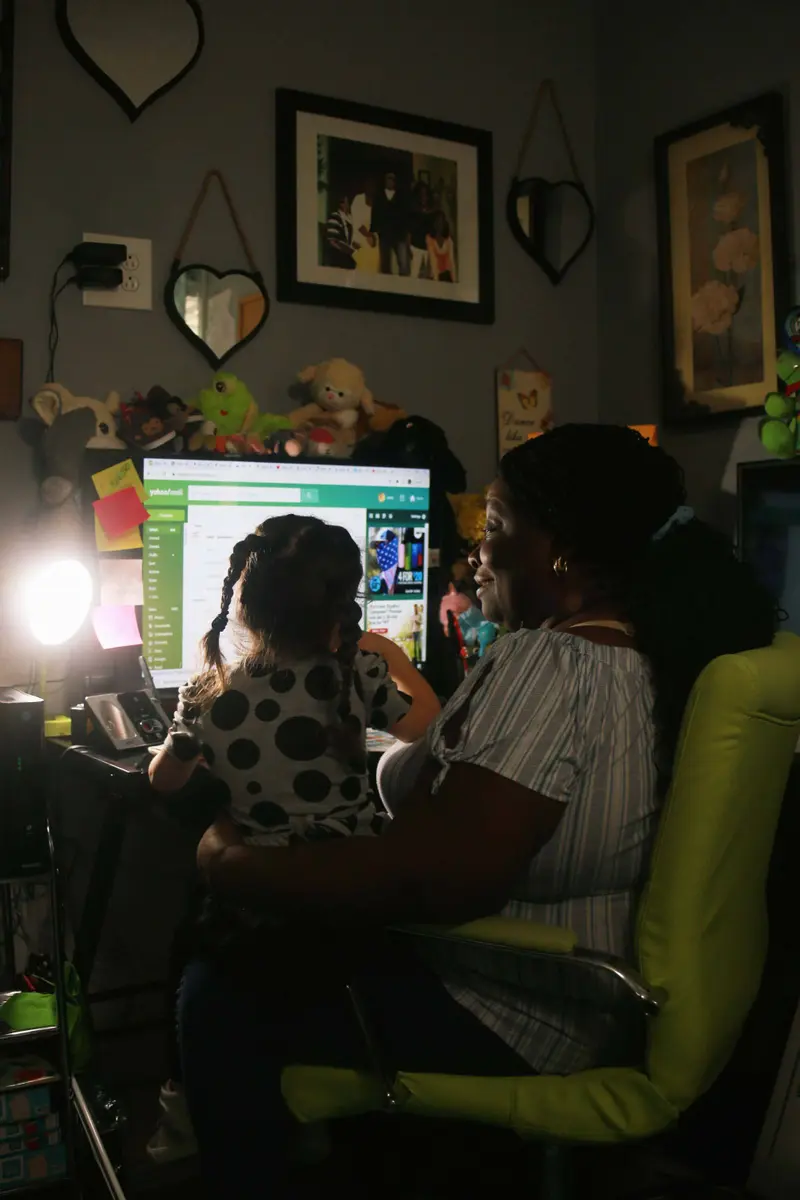
Jackie hung up and walked over to Mallory Talbott’s daughter, McKenna, who was standing in a playpen in her dim living room. McKenna had unzipped her footie pajamas and taken them off. “What are you doing?” Jackie asked her. “Haven’t we had this discussion? You can’t be showing your goods. You cannot. You are a lady.” McKenna stared at her blankly. Jackie gently pulled her pajamas back on as a Humpty Dumpty cartoon played on one of three TVs.
On the day before her hearing, Jackie didn’t bother to dress. In her floral nightgown, she typed out a new sleep observation form for Damion’s Place, an employee log, an updated menu. She designed and ordered new scrubs, emblazoned with her logo, for her staffers. She admired the uniforms like they were the future.
Jackie had been reading about Biden’s intentions to save the industry. They would take clearer shape in the spring with his American Families Plan, the most comprehensive proposal in the 50 years since Nixon’s veto. It would limit child care costs for working- and middle-class families to 7% of their income, ensure that subsidies covered the true cost of quality care and help fund higher wages for child care workers. The $1.8 trillion package, including landmark spending on universal pre-K and community college, would likely face challenges in Congress, and on the issue of child care, it hadn’t nailed down states’ roles in determining how the money would be spent. Another temporary aid bill would offer rescue funds to providers like Jackie and, for one year, increase tax credits for eligible parents, but it wasn’t enough to overhaul the system.
Once night fell, Jackie left her computer and sprawled across her living room’s leather sofa. She video-chatted with her youngest son, Isaiah, and marveled at the big house he shared with his brother.
“And I’m gonna go to the firefighter academy, so the next house is gonna be even better!” Isaiah said.
“You’ll buy me a big, beautiful house,” she teased. “What am I gonna do with the $600,000 house you buy me?”
She called her son Sedrick next and asked to hear his latest track. He was trying to make it in music, and Jackie had no qualms giving unsolicited advice.
“You need a different beat,” she said.
“Don’t want one,” Sedrick shot back.
“Not what you want, it’s what’s gonna sell,” Jackie said.
A little before 11 p.m., the doorbell rang. Jackie pushed herself off the couch and walked over to the entrance, where a UPS driver named Tannette Avery said, “Here’s the man.”
Jackie pulled 6-month-old Tommy in from the winter chill. She took off his jacket and set him in a playpen by her couch. Sucking his pacifier, he rolled over onto his stomach. Jackie flicked off the light, sat down and pulled a fleece over her legs. She had 10 hours until her hearing. But just as she rested her head back, Tommy started to whimper.
“Tommy Tom,” Jackie said into the dark night, “please don’t start.”
The following morning, Jackie let two kids into her house, passed them off to Willie, and then sat at her desk for her hearing on Zoom, wearing the same floral nightgown. Without money for a lawyer, she was representing herself, and she hadn’t prepared witnesses or questions. For two hours, the state’s lawyer walked through each inspection of Damion’s Place in precise detail. Regulators described a pattern of noncompliance, and as Jackie listened, she sucked back tears. She held her brief remarks until the end.
“I just want to say that I try my best,” Jackie said. “I have had a struggle with getting people employed because of the pandemic.” She explained that she was in the process of hiring a whole new staff, and she believed that they would be good. “Gotta admit, this is my first center, a lot of things I didn’t know. But rest assured, I am not trying to be out of compliance, and right now, feel I am in compliance. I enforce the rules better, made forms to enforce the rules better. There’s not much more for me to do.”
The judge concluded by saying that he wouldn’t make a decision straight away, but he promised to deliver one soon. Jackie signed off and lay her head in her hands. From the tenor of the call, she figured that the state would shut down her center. She’d just renewed her lease at Damion’s Place, and now she couldn’t get out of it. “Oh Jesus, I’m tired,” she said. “Two years of paying for a building I cannot use. Two years.” In the privacy of her office, behind a closed door, she allowed herself to sob, letting out a deep moan.
Her doorbell rang. A mother who worked at a grocery store had come to pick up her son. “Everybody have a good day?” she asked, as she wiped her feet at the door.
Jackie wasn’t prepared to say aloud what she was just beginning to understand.
“Mhhmmm,” she replied.
It would be another seven weeks before the judge would issue his decision. On April 7, he would deny Jackie’s Kansas license for Damion’s Place. Her backup center would not be ready. Jackie’s capacity would be limited to 18 children at her home child care in Missouri — six kids on each of her three shifts. She wouldn’t have room for Brittney, the community college student and nighttime FedEx worker, to bring her kids. Brittney would end up leaving her job to watch her children, after what she’d come to see as an “extended stay” in employment. Jackie would be too nervous to ask other parents how they’d fared in her shutdown. She would wonder if it was even possible to build an enterprise for these families.
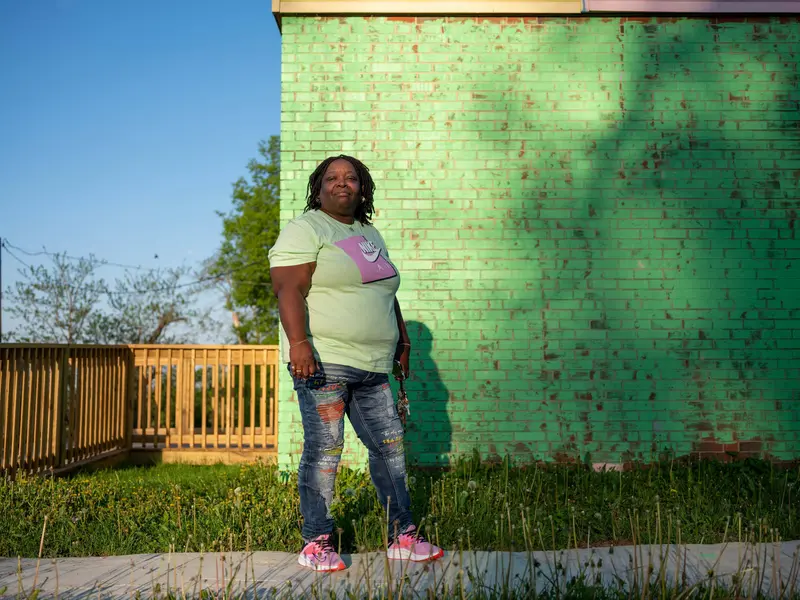
For now, though, as the evening light waned in her office on the day of the hearing, Jackie got to work planning her next move. Her mind traveled to the future, its most comfortable place. Even though COVID-19 was surging, she believed that enrollment would soon improve. That the 3 million women who had lost jobs in the pandemic would return to work. That if she found just one more location, a backup for her backup center, she could keep all of her kids. Then, even more parents would come running.
She opened Zillow and traced her mouse down the border between Missouri and Kansas. She zoomed in on 46th street, on a stretch of rentals on the Missouri side. “These would be perfect,” she said. $2,700 a month. $1,750 a month. $2,200 a month. “Too much money. That won’t be happening.” She hit on a new listing, for $1,050 a month. A gray one-story on Liberty Street. “Hardwood floors. One bath.” She clicked her tongue. “This one’s doable.”
She started answering Zillow’s questions to request a tour for the following morning. Desired lease? 12 months. Household size? She laughed. Credit score? “Really?” Her credit was down from 750 to 631. “This is gonna be harder than I thought.”
She called a friend who worked in real estate. When he picked up, she put on a bright, commanding voice.
“Heyyy, Will Amazing,” she started. “I need you to find me a house.”
May 17, 2021: ProPublica removed biographical details about mother Annette Ligon, who claimed to be practicing psychology, after learning that she had, under a different name, pleaded guilty to health care fraud; authorities said she had pretended to be a psychologist. When ProPublica brought this to her attention, Ligon said she had been vindicated but did not supply supporting documentation.
